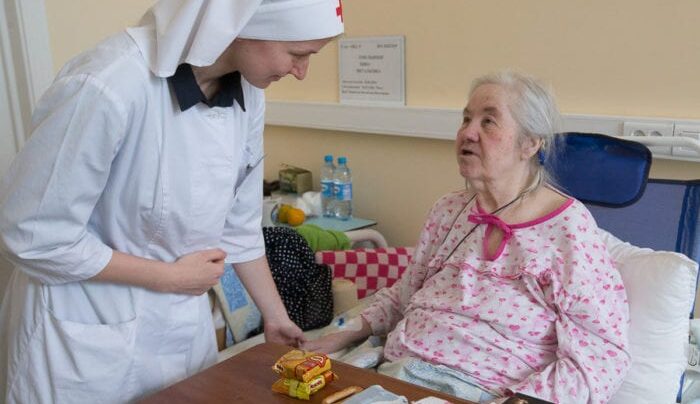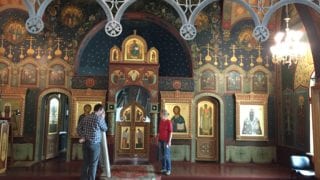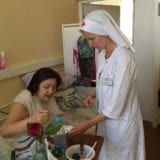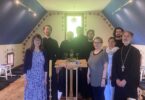In the 1990s, Ekaterina’s parents emigrated to New Zealand and, as she herself likes to joke, took her with them in her mother’s belly. After graduating from school, Katya studied medicine and worked as a nurse in a hospital in New Zealand. For the past two years, she has been coming to Moscow for a few months at a time to work as a volunteer at St. Alexis Hospital. In this interview published in the Moscow journal FOMA, Ekaterina explains her reasons for doing this. This translation has been made possible by a grant from the American Russian Aid Association – Otrada, Inc.
Yesterday, entirely by chance, I had to bring someone to a trauma center. I got out of a trolleybus and at the stop, I saw a man about thirty years of age, the left side of whose head was a bloody mess.
Yesterday, entirely by chance, I had to bring someone to a trauma center. I got out of a trolleybus and at the stop, I saw a man about thirty years of age, the left side of whose head was a bloody mess. The bone was sticking out, his eye was nowhere to be seen, and blood was dripping onto the pavement. And it was as if the other passengers from the trolleybus had evaporated, leaving me there alone. I was afraid: should I go up to this man or not, if he himself was not asking me to do so? But I could see that he was in a bad state. I said, “Sir, is everything alright?” He mumbled something inaudible in reply. In all likelihood, he had been drinking a lot and then a fight had broken out; wounds from accidents are different from the ones he had. I was at a loss about what to do with him. And then a passerby said that there was a trauma center nearby and I ought to take the patient there.
On the way, I try to ask him questions to keep him from losing consciousness. I found out that he was called Konstantin, I told him it’s a good name. When I told him mine, Kostya [short for Konstantin —trans.] reacted humorously: “That’s also not too shabby!” I tried to find out where the wound was from, but his response was unintelligible. At long last, we made it to the trauma center and the doctors set about dealing with him. Unfortunately, I do not know what happened to him after that. But I am worried about how he is doing there. One cannot be a sister of charity [i.e. a nurse —trans.] just in one particular hospital; it is a ministry that encompasses your entire life, wherever you might be. My dad sometimes even jokes about me, “You’ll go about treating anyone!”
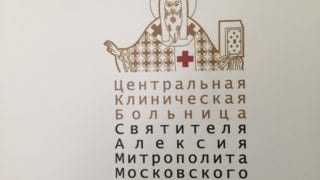 There is a tradition in our department [in St. Alexis Hospital in Moscow – ROCOR Studies] that every day, at 4:00 p.m, all the workers and patients who are able to do so, gather in the hallway before the icon of the Mother of God and sing an akathist.
There is a tradition in our department [in St. Alexis Hospital in Moscow – ROCOR Studies] that every day, at 4:00 p.m, all the workers and patients who are able to do so, gather in the hallway before the icon of the Mother of God and sing an akathist.
Our move to New Zealand radically changed not only the outward life of our family, but also our inner, spiritual life. It was there that my father found his faith and introduced me to the Church. There is an Orthodox community at the church of the Resurrection in Auckland, where I have been singing in the choir from my youth.
My grandmother worked at a care facility for the elderly, and would take me there with her when I didn’t have to go to school. I liked it there a lot. Since then, I have had an interest in medicine and in people who need attention. I was very much inspired, at one time, by the story of the Imperial Family, about the girls who were sisters of charity, as well as, of course, by that of Saint Elizabeth Fedorovna, who founded Ss. Martha and Mary Convent of Charity.
I became interested in whether there might be something similar in contemporary Russia. The first thing I found was the Saint Elizabeth Convent in Minsk, followed by the Web portal miloserdie.ru. It was then that I realized that I wanted to be a sister of charity. I had had this thought for a long time, but it only definitively took shape after I had studied medicine and worked as a nurse in New Zealand. I told the rector of our Church, Archpriest Vladimir Boikov, about my dream, and he organized my first trip to St. Alexis Hospital in Moscow.
The clinic in New Zealand respects volunteers who travel abroad, so they let me go to Russia, no questions asked.
St. Alexis Hospital is an Orthodox hospital in Moscow where treatment is free. I work in the department of palliative care. Most of the patients in it have been diagnosed with terminal illnesses, for example, cancer. Many of them are bedridden and thus require particular attention. I wash them, feed them, and talk to them a lot. It is very important for people to feel that someone still needs them, because a lot of them do not have relatives or friends, or cannot visit them if they do.
In the hospital in New Zealand, I had an interesting encounter with an elderly Russian lady. I volunteered to care for her when I saw her name on the list of patients. They tried to talk me out of it by telling me stories about her difficult personality. But I was sure that we, as Russians, would come to an understanding. The lady had a difficult personality and an equally difficult form of dementia; her memory would sometimes fail entirely.
Once, while I was washing her, she began to assert that some babaiki [boogeymen – transl.] had appeared under the bed next to hers. I did not quite understand what she meant and, of course, I did not notice anything there myself. But I recommended that she say some prayers, even though topics such as religion and politics are not recommended for discussions. She at once grabbed my hand and began to say the prayer “Our Father” so loudly that everyone in the ward could hear! This is despite the fact that she does not always remember her name and where she is. She immediately felt better after saying the prayer.
Unfortunately, the Russian speakers in old people’s homes in New Zealand suffer not from a lack of comfort, but from a lack of interaction. They are émigrés who moved there on their own or with their children but do not know the language. We thus organized a small team of volunteers in our church who share responsibility for visiting elderly people in hospitals. Just to speak to them; this is in and of itself a real gift for them. Facebook helps us to coordinate in this regard; you just issue an appeal, and people react joyfully, going to see some older woman whom they do not know at all.
Haircare is very important! Almost all the patients ask to be combed, to have their hair done up in a ponytail or a braid. I was very sad last year when I left for New Zealand. Here, at St. Alexis Hospital, two of the most important things in my life have come together: Orthodoxy and medicine. It was hard to go back and leave this environment. I can see that sick people are isolated to a certain extent in the Western world. There, for example, it is hard to volunteer in a hospital; you have to pass a lot of bureaucratic hurdles that not everybody can overcome. You have to get checked and rechecked a huge number of times. And if you get through these, they will not let you do anything except interacting with people in an everyday manner (and even then the topics of politics and religion are not advisable subjects for conversations). In St. Alexis Hospital, the form of help given to suffering people is more open. Just about everyone who wants to help is able to do so.
Often, people come to New Zealand searching for a better, quieter life. It is true that there is very little bustle there. If you are walking down the street and someone is coming the other way, you can smile at him and he will smile back. It seems idyllic. But alongside this, it is a completely different society, which, in our time, presents Christians with difficult challenges.
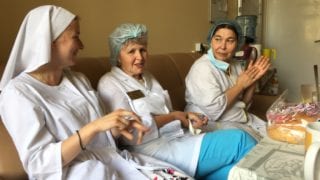 One feels particular pain at the idea of euthanasia being legalized. I am afraid for the unhappy elderly ladies and men who feel they are a burden and will thus consent to this procedure. As soon as the “choice to live or not to live” (as they say) is available, any real choice vanishes. I am convinced that they will be compelled psychologically to do it in order not to inconvenience others. It is very hard to live in a “topsy-turvy” society where the murder of a human being is being passed off as a form of help.
One feels particular pain at the idea of euthanasia being legalized. I am afraid for the unhappy elderly ladies and men who feel they are a burden and will thus consent to this procedure. As soon as the “choice to live or not to live” (as they say) is available, any real choice vanishes. I am convinced that they will be compelled psychologically to do it in order not to inconvenience others. It is very hard to live in a “topsy-turvy” society where the murder of a human being is being passed off as a form of help.
As a person of faith, I have an understanding of the fact that, at times, suffering is given for cleansing or to help people rethink their lives, while the suffering person is given to others so they can perform works of charity. Here, at St. Alexis Hospital, a lot of people partake of the holy mysteries only right before they die. And they depart in peace. A person can, in fact, decide whether he wishes to live or to die, and this unfortunately sometimes happens, but there is no need for medicine to get mixed up in this; it exists in order to help people. I say this all 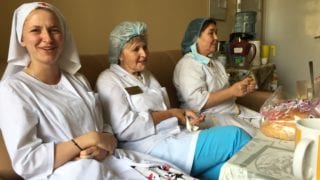 the time: get off the couch and do something for people so that they don’t suffer in this way.
the time: get off the couch and do something for people so that they don’t suffer in this way.
The easiest thing to say is: “This old lady is suffering, let’s give her euthanasia.” No: come to her, feed her, wash her, show her some respect. Even just talk to her; this is ultimately what charity is about, and not: “Send her off to the next life and keep on living in your comfortable world”. In New Zealand, however, there are entire “Nurses for Euthanasia” Facebook groups.
I have talked a lot about palliative care with my friends, even with those who aren’t in medicine. I tell them about how it eases a patient’s life without killing him. My friends were shocked: they hadn’t even suspected that such a form of help could exist. People are under the impression that a dying person is totally enveloped in suffering. I try to explain that this is not the case. Each patient has his own sorrows and joys even while living such a life. For example, when a person first walks again on his own after a stroke, he feels such joy as we, ordinary people, never experience. But if we allow euthanasia, a person will simply never reach this stage. We come under the impression that everything is hospitals is bad and we thus need to “put everyone out of their suffering”.
Working in palliative care with dying people completely transforms your consciousness. You start looking at a lot of problems and things from the point of view of eternity and of your answerability to God after death.
 Working in palliative care with dying people completely transforms your consciousness. You start looking at a lot of problems and things from the point of view of eternity and of your answerability to God after death. You stop worrying about all sorts of non-essential, trivial things, like a new telephone or fashionable clothing. The most important thing is not to lose sight of this when you get back. In Moscow, there are always churches open everywhere where you can obtain spiritual support, whereas in Auckland, where I live, there is only one Orthodox church, and services take place only on Sundays and holidays. May God grant the Russians to value what they have.
Working in palliative care with dying people completely transforms your consciousness. You start looking at a lot of problems and things from the point of view of eternity and of your answerability to God after death. You stop worrying about all sorts of non-essential, trivial things, like a new telephone or fashionable clothing. The most important thing is not to lose sight of this when you get back. In Moscow, there are always churches open everywhere where you can obtain spiritual support, whereas in Auckland, where I live, there is only one Orthodox church, and services take place only on Sundays and holidays. May God grant the Russians to value what they have.
Interview by Kirill Baglai; Photographs by Deacon Andrei Psarev. Names of patients have been changed.

